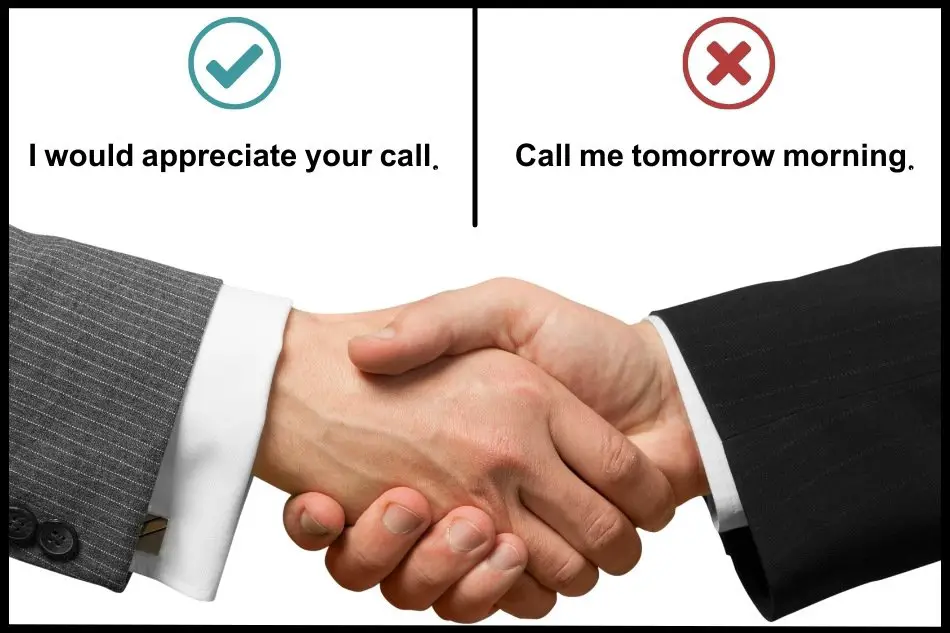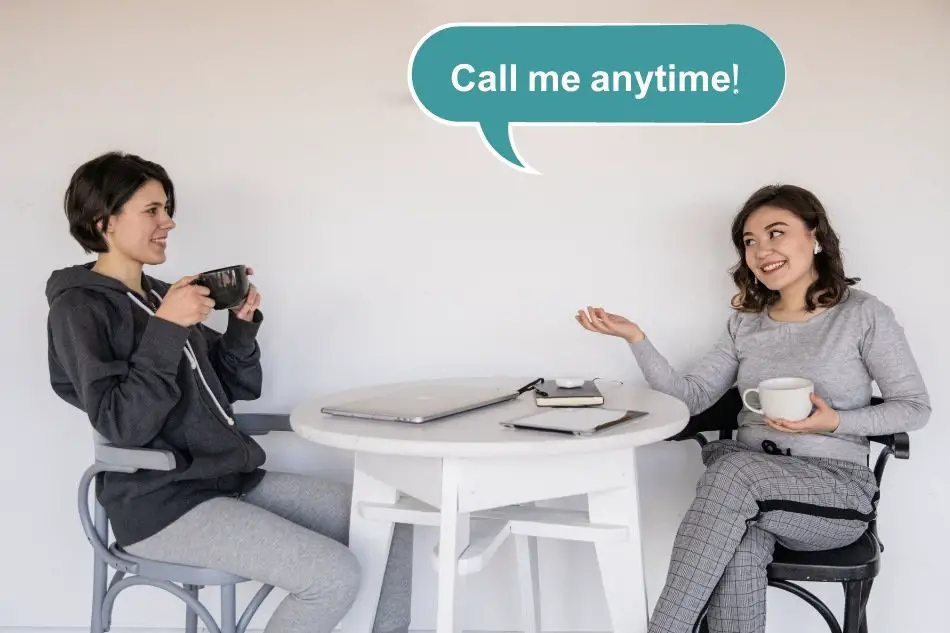In both personal & professional life, we need to talk to people surrounding us in person or through phone calls for different purposes. In many cases, we may need to ask for permission to call them later or politely request them to call us. Here I’ve got some polite expressions, including some tips that you can use to ask someone to call you.
“Would you please call me at your earliest convenience?” is the most appropriate way to ask someone to call you. You can also ask someone to call you by simply saying, “Please call me when you are available.” You should be polite in your choice of words & tone while asking someone to call you, no matter in which context: formal or informal you are.
Are you looking for a book or a guide to help you learn and improve your English? You may try English Made Easy Volume One: A New ESL Approach: Learning English Through Pictures (Amazon Link).
Table of Contents
- Asking People to Call You in Formal Contexts
- Asking People to Call You by Using “Would” or “Could”
- Asking People to Call You in Informal Contexts
- Things to Remember While Asking Someone to Call You
- A Sample Conversation on Asking Someone to Call You in English
- In Conclusion
- 10 Frequently Asked Questions Related to Asking Someone to Call You in English
How you can ask someone to call you may vary from person to person or situation to situation. In this part of the post, I will share several expressions you can use in formal & informal contexts. Later, I’ll provide some tips to help you politely request someone to call you so that you don’t get rejected.
Asking People to Call You in Formal Contexts

The way we talk varies depending on the situation. Our diction, voice tone, body language, and way of putting words together in formal situations differ from casual ones. So, we also need to consider the context while asking someone to call you.
If you’ve just met someone, you cannot ask them casually to call you. Likewise, if you are in a professional setting and need to ask someone to call you, you should consider the setting formal and speak accordingly.
Using modal auxiliary verbs like “Would” & “Could” can help you sound formal, polite & less direct. You can use them in formal settings to make polite requests, ask for permission, offer something to someone, etc.
We can use certain modal verbs, especially the past forms of the modal verbs can, may, shall and will (could, might, should and would), to be more polite or less direct.
Cambridge Dictionary
In the next part of the post, I’ll share some expressions with “Would” & “Could” that you can use to ask someone to call you.
Asking People to Call You by Using “Would” or “Could”
Here, I present a list of expressions using “Would” that you can use in formal settings to ask someone to call you.
- Would you please call me at your earliest convenience?
- Would you like to call me tomorrow to talk about the new project?
- Would you mind calling me on Tuesday afternoon to talk about it?
- Would you mind calling me when you have time?
- Would it be okay for you to call me later?
- Would you please call me back at a convenient time for you?
- Would you call me in the evening, please?
- Would you please call me when you are free?
- Would you please manage some time to call me tomorrow?
- I would appreciate your call.
- I would appreciate it if you could call me later.
- I would look forward to your call.
- Would you please call me back when you are available?
- Would you please call me whenever you get a chance?
- Would you mind calling me back when you have enough time to talk about it in detail?
- Would you please call me once you are done with your task?
Note: You can use the modal verb “Could” instead of “Would” in all the above sentences to ask someone to call you in a formal context.
Asking People to Call You in Informal Contexts

Talking in informal settings makes you feel relaxed and unconcerned about the context. You usually stay casual with close friends or family members. Your choice of words and tone seems casual.
Yet, you should remain polite whether you are in a formal or informal setting. Your words, voice tone, and body language should not offend someone. Remember! Politeness is the key to a good conversation. Use the word “please” to sound polite regardless of the context. Now, I’ll share some expressions that you can use to ask someone to call you.
- Please call me when you are free.
- If you can manage your time, can you call me tonight?
- Call me later, please.
- Don’t forget to call me please, it’s urgent.
- If you are available this weekend, please call me. I got a plan.
- Hey! This is my new number. Call me after the office.
- Call me as soon as possible.
- Call me as soon as you are available to talk.
- Please call me back.
- Call me back tomorrow morning!
- Call me soon, please.
- Can you call me in an hour?
- Call me when it’s possible.
- Call me anytime. No problem at all.
There are plenty of other ways to ask someone to call you. Be creative based on your needs and situation. Get going by practicing with your friends.
Things to Remember While Asking Someone to Call You
- Try to mention the reasons why you are asking someone to call you. When you show reasons, people feel convinced.
- Mention your preferred time if possible. But don’t just think about your convenient time. Think about theirs too. Settle through discussion, if possible.
- Politeness is the key. Be polite in all possible ways while asking someone to call you.
- Don’t just keep saying. Listen to what they say. Communicate your needs properly.
- Don’t sound like you are ordering them to call you, no matter whether you are talking to your superior or subordinate. Request them to call you.
A Sample Conversation on Asking Someone to Call You in English
The following conversation shows how Mike politely asks John to call him.
John: Hi, Mike. I wanted to consult you about a new investment. I’ve been thinking of investing in properties lately. What’s your take on that?
Mike: That’s great thinking! Real estate properties are a lucrative field nowadays. How much are you interested in investing at this moment?
John: Maybe a hundred grand.
Mike: That much money would be risky to start with. You should fathom the water’s surface before going into that big. I think fifty grand would be a good start.
John: You think that’s enough?
Mike: Sure. You must learn about the market initially and then step up gradually.
John: How’re you so sure about that?
Mike: I’ve got two clients who’ve been investing in properties for a decade. I know their records quite well.
John: Wow! Can you get me some insight?
Mike: Mmm…. I need to take a look at some data. Would you mind calling me in the evening?
John: Sure thing. I need your experience and knowledge for a secure investment. However, if I skip the call somehow, please, call anytime after 10 at night, if that’s okay with you.
Mike: Don’t worry, I will.
Takeaway Words
Consult (verb) = to take expert advice from someone or a source of information
Investment (noun) = an expense of money or valuable asset to gain profit
Properties (noun) = valuable assets, such as lands, apartments, crops, mines, machinery, etc.
Lucrative (adjective) = a business, investment, or deal that is highly profitable
Instruments (noun) = tradable bills, certificates, bonds, notes, etc., on the money market
Grand (adjective) = meaning a thousand dollars or pounds
Fathom (verb) = to measure or scale the depth or function of something
Surface (noun) = an upper layer or part of a structure
Insight (noun) = ability to learn and understand something effectively
Decade (noun) = a time span of ten years
In Conclusion
Well! I have discussed how to prepare yourself and what you can say to ask someone to call you. I hope it will ease your effort.
Thanks for reading!
Happy learning!
10 Frequently Asked Questions Related to Asking Someone to Call You in English
1. Why might someone prefer a phone call over text or email?
Phone calls can convey tone, urgency, and clarity more effectively than written communication, especially for complex or sensitive matters.
2. What are common phrases to request a call?
You can use phrases like “Can you give me a call?”, “I’d prefer to discuss this over the phone,” or “Please call me when you get a chance.”
3. How can tone influence the request for a call?
A polite and gentle tone can make the request feel non-demanding, while a more urgent tone can convey the importance of the call.
4. Can body language play a role in such requests?
In face-to-face situations, nodding, maintaining eye contact, or gesturing to one’s phone can supplement the verbal request.
5. How can I ensure the person knows the importance of the call?
Specify the reason for the call or mention that it’s urgent or essential to emphasize its significance.
6. What should I do if the person doesn’t return my call?
Consider sending a gentle reminder or follow-up message to reiterate the importance of the call.
7. How can I handle situations where I need to ask for multiple calls?
Be clear about the need for multiple discussions, offer flexibility in timing, and express appreciation for the person’s time and understanding.
8. Are there cultural nuances in asking someone to call?
Yes, in some cultures, direct requests might be the norm, while in others, more indirect or formal phrasing might be preferred. It’s crucial to be aware of cultural norms.
9. How can I teach children to request phone calls politely?
Role-playing, discussing the importance of tone and wording, and modeling polite behavior can guide children in making courteous requests.
10. Is it appropriate to ask for a call in professional settings?
Certainly. Especially in business contexts, phone calls can be a more efficient way to discuss intricate details, clarify doubts, or build rapport. Always ensure the request is professional and considerate.





